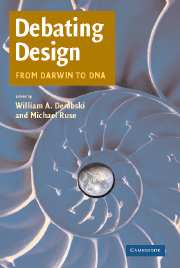Book contents
- Frontmatter
- Contents
- Notes on Contributors
- Debating Design
- INTRODUCTION
- PART I DARWINISM
- PART II COMPLEX SELF-ORGANIZATION
- PART III THEISTIC EVOLUTION
- 12 Darwin, Design, and Divine Providence
- 13 The Inbuilt Potentiality of Creation
- 14 Theistic Evolution
- 15 Intelligent Design
- 16 The Argument from Laws of Nature Reassessed
- PART IV INTELLIGENT DESIGN
- Index
- References
12 - Darwin, Design, and Divine Providence
Published online by Cambridge University Press: 05 June 2012
- Frontmatter
- Contents
- Notes on Contributors
- Debating Design
- INTRODUCTION
- PART I DARWINISM
- PART II COMPLEX SELF-ORGANIZATION
- PART III THEISTIC EVOLUTION
- 12 Darwin, Design, and Divine Providence
- 13 The Inbuilt Potentiality of Creation
- 14 Theistic Evolution
- 15 Intelligent Design
- 16 The Argument from Laws of Nature Reassessed
- PART IV INTELLIGENT DESIGN
- Index
- References
Summary
To the theist, a central question after Darwin is whether evolution renders implausible the notion of divine Providence. Do the rough and ragged features of the new story of life place in question the idea of a personal God who cares for the world? Most theologians today would say no, but the more intimately the idea of Providence is tied to that of “intelligent design,” the more difficult becomes the task of reconciling theology with evolutionary biology. I suspect that much of the energy underlying so-called Intelligent Design (ID) theory, in spite of explicit denials by some of its advocates, is an achingly religious need to protect the classical theistic belief in divine Providence from potential ruination by ideas associated with Darwinian science. It is impossible not to notice that the advocates of IDT are themselves almost always devout Christian, Muslim, and occasionally Jewish theists. It is difficult, therefore, for most scientists and theologians to accept the claim that no theological agenda is at work in the ID movement.
It is highly significant, moreover, that scientific proponents of ID, although often themselves experts in mathematics and specific areas of science, are generally hostile to evolutionary theory (Behe 1996; Dembski, 1998, 1999; Johnson, 1991, 1995). The justification they usually give for rejecting what most scientists take as central to biology is that Darwinism, or neo-Darwinism, is simply a naturalist belief system and not science at all.
- Type
- Chapter
- Information
- Debating DesignFrom Darwin to DNA, pp. 229 - 245Publisher: Cambridge University PressPrint publication year: 2004
References
- 7
- Cited by



